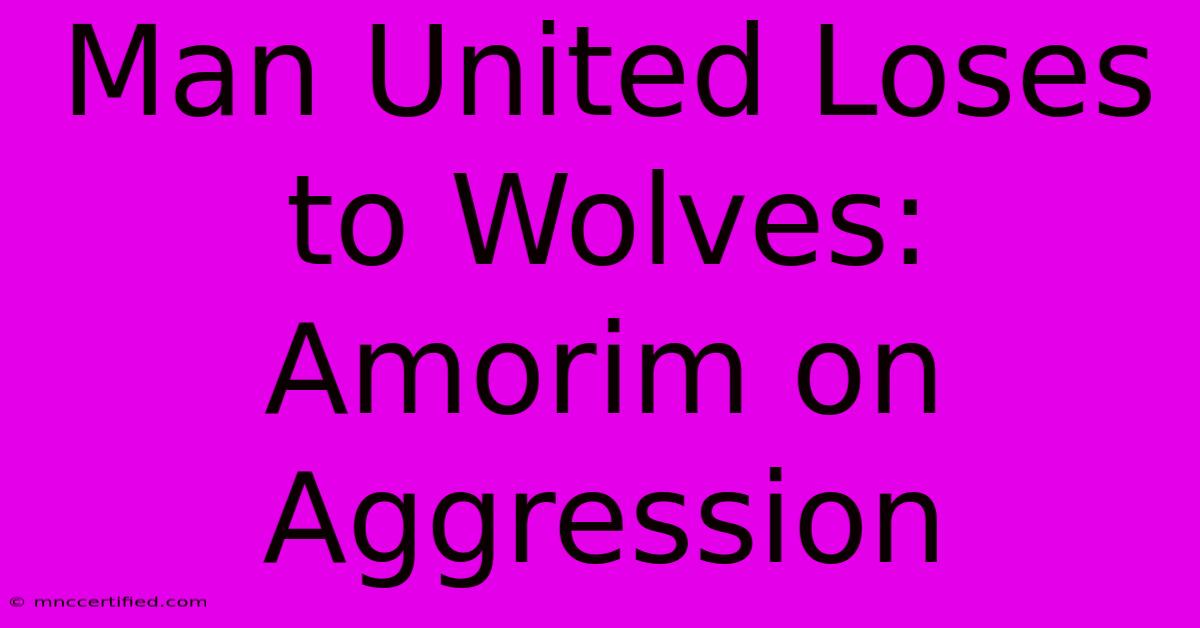Man United Loses To Wolves: Amorim On Aggression

Table of Contents
Man United Loses to Wolves: Amorim's Take on Aggression Fuels Debate
Manchester United's shock 1-0 defeat to Wolves at Old Trafford has sent ripples through the football world, sparking intense debate surrounding the game's key moments and tactical approaches. While the result itself is undeniably disappointing for Erik ten Hag's side, the post-match analysis has largely centered on Wolves manager Julen Lopetegui's tactical masterclass and the aggressive approach adopted by his team. This analysis dives deep into the match, focusing on Lopetegui's comments about aggression and its role in securing the victory.
Wolves' Aggressive Tactics: A Winning Formula?
Wolves’ win wasn’t a fluke; it was a meticulously planned victory built on a foundation of aggressive, high-pressure football. They disrupted Manchester United's rhythm from the first whistle, consistently pressing high up the pitch and forcing errors. This aggressive style, far from being reckless, showcased exceptional tactical discipline and execution. The players understood their roles, harrying United's midfield and stifling their creative players, particularly Bruno Fernandes and Marcus Rashford. This suffocating pressure ultimately led to the winning goal, a moment of brilliance born from chaos created by Wolves' relentless aggression.
Lopetegui's Post-Match Comments: A Strategic Insight
Lopetegui, in his post-match interview, subtly highlighted the importance of this aggressive style, praising his players' commitment and intensity. While he didn't explicitly state "aggression was the key," his comments emphasized the controlled nature of their pressing, highlighting the tactical awareness required to execute such a strategy effectively. This isn't simply about brute force; it's about intelligent, coordinated aggression. His words suggest a carefully orchestrated plan designed to exploit perceived weaknesses in the Manchester United setup.
Manchester United's Vulnerability: Exposed by Wolves' Aggression
The match exposed some vulnerabilities within the Manchester United team. Their midfield struggled to cope with Wolves' relentless pressure, and their usually potent attack was stifled by a well-organized defense. The lack of fluidity and creativity in midfield allowed Wolves to dictate the tempo and control the midfield battle. This highlights the need for Ten Hag to address these issues, potentially through tactical adjustments or squad changes. The defeat serves as a harsh reminder that even the strongest teams can be undone by a well-executed, aggressive game plan.
Analyzing the Goal: A Consequence of Aggressive Pressure
The winning goal, scored by Matheus Cunha, was a direct consequence of Wolves’ sustained pressure. The build-up play showcased their ability to transition quickly from defense to attack, capitalizing on a defensive lapse from United. This highlights the effectiveness of their high-pressing strategy and its ability to create scoring opportunities even against defensively strong teams.
The Bigger Picture: Lessons Learned and Future Implications
The Man United vs. Wolves game provides valuable insights for both teams. For Wolves, it’s a testament to the effectiveness of a well-executed aggressive strategy. For Manchester United, it's a wake-up call, highlighting the need for improved midfield cohesion and a more robust response to high-pressure tactics. The match serves as a reminder that in the unpredictable world of football, tactical flexibility and a robust response to different playing styles are crucial for success. The debate surrounding Lopetegui's emphasis on aggression will likely continue, underscoring its significance in modern football tactics.
Keywords: Man United, Wolves, Julen Lopetegui, Erik ten Hag, Premier League, Football, Soccer, Aggressive Tactics, Tactical Analysis, Match Analysis, Post-Match Interview, High-Pressure Football, Manchester United vs Wolves, Old Trafford, Cunha Goal, Midfield Battle, Football Strategy
SEO Considerations: This article uses relevant keywords naturally throughout the text, incorporates various header tags for better readability and SEO, and is structured logically to enhance user experience. Off-page SEO would involve promoting the article through social media, relevant forums, and other online channels. Internal linking within a website containing similar football analysis would further boost SEO.

Thank you for visiting our website wich cover about Man United Loses To Wolves: Amorim On Aggression. We hope the information provided has been useful to you. Feel free to contact us if you have any questions or need further assistance. See you next time and dont miss to bookmark.
Featured Posts
-
2024 Game Above Pittsburgh Vs Toledo Odds
Dec 27, 2024
-
Chelsea 1 2 Fulham Stoppage Time Winner
Dec 27, 2024
-
Everton Vs Man City Premier League Result
Dec 27, 2024
-
Wolves Defeat Amorim Criticizes Aggression
Dec 27, 2024
-
Open Ai Service Outage Full Explanation
Dec 27, 2024